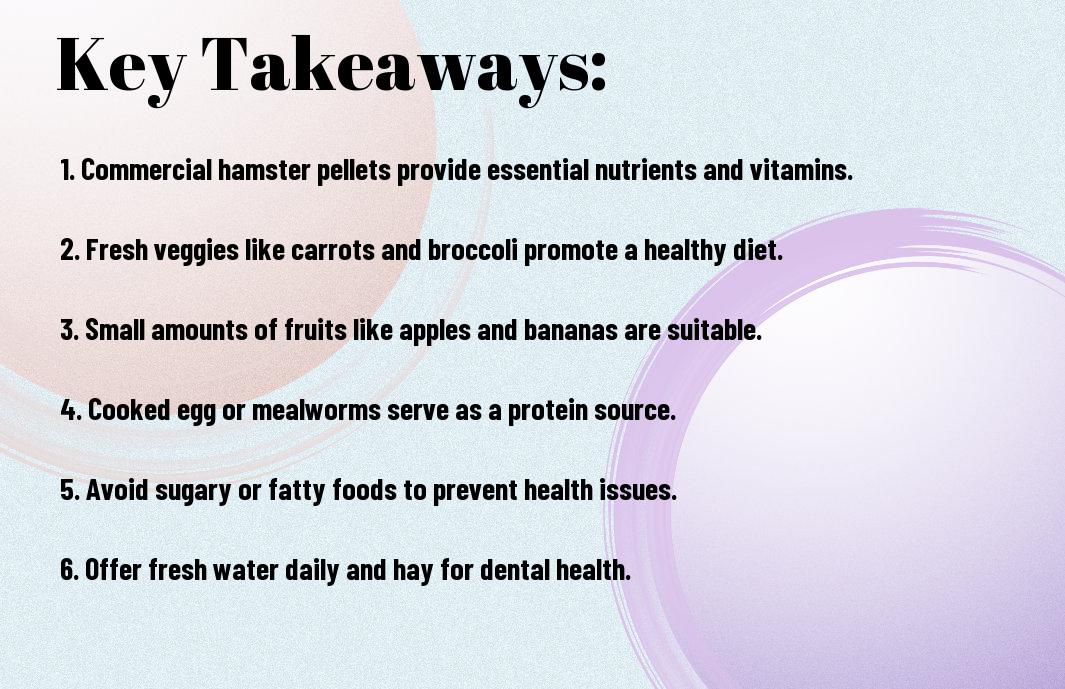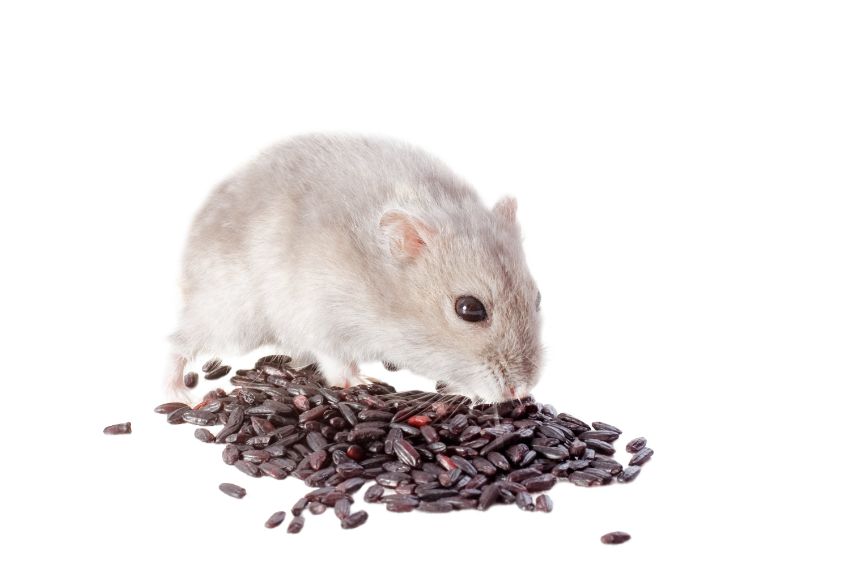Ensuring that you are providing the best nutrition for your pet hamster is crucial for their health and well-being. You might be wondering what the best types of food are to feed your furry friend. It’s important to understand that you should never feed your hamster certain foods, as they can be dangerous to their health. In this blog post, we will discuss the best types of food to feed your pet hamster, as well as the foods to avoid at all costs.
Key Takeaways:
- High-quality hamster pellets: Choose a good brand of hamster pellets that are specifically formulated for hamsters to ensure they are getting all the essential nutrients they need.
- Fresh fruits and vegetables: Offer a variety of fresh fruits and vegetables as treats, such as apple slices, carrots, and broccoli, to provide additional vitamins and minerals to your pet’s diet.
- Protein-rich foods: Provide protein-rich foods like cooked egg, mealworms, or small pieces of cooked chicken in moderation to supplement your hamster’s diet and support their overall health.

Natural Diet of Hamsters
Clearly, to ensure the health and well-being of your pet hamster, it is important to understand its natural diet. In the wild, hamsters primarily feed on seeds, grains, insects, and occasionally fruits and vegetables. They are omnivores, but their diet is mainly made up of plant-based foods.
Foods found in a Hamster’s Wild Habitat
In their natural habitat, hamsters forage for seeds such as sunflower seeds, flax seeds, and pumpkin seeds. They also consume grains, including wheat, oats, and barley. Additionally, hamsters will eat insects, such as crickets and mealworms, when they are available. On occasion, they will also munch on small amounts of fruits and vegetables that they come across.
How to Mimic a Natural Diet in Captivity
When caring for a pet hamster, it’s important to mimic their natural diet in captivity as much as possible. This means providing them with a high-quality hamster mix that contains a variety of seeds and grains. You can also supplement their diet with fresh fruits and vegetables, as well as the occasional insect treat. It’s essential to provide a balanced diet to ensure your hamster receives all the nutrients it needs to thrive.
Commercial Hamster Foods
However, if you don’t have the time or resources to create a homemade diet for your pet hamster, commercial hamster foods can be a convenient option. These specially formulated foods are designed to meet the nutritional needs of hamsters and are widely available at pet stores and online.
Evaluating Packaged Hamster Pellets and Mixes
When choosing a commercial hamster food, it’s important to carefully evaluate the ingredients and nutritional content. Look for a food that is specifically formulated for hamsters, as they have different dietary needs than other small animals. Check the list of ingredients to ensure that the food contains a good balance of protein, fiber, and essential vitamins and minerals. Avoid foods that contain large amounts of fillers, such as corn or seeds, as these can lead to obesity and other health issues in your hamster. Opt for high-quality pellets or mixes that are nutritionally balanced and free from harmful additives.
The Role of Treats in a Hamster’s Diet
While commercial hamster food should make up the majority of your pet’s diet, treats can be given in moderation. These can include small amounts of fruits and vegetables, as well as specially formulated hamster treats available at pet stores. However, it’s important to remember that treats should only make up a small portion of your hamster’s overall diet. Too many treats can lead to nutritional imbalances and weight gain, so it’s important to use them sparingly. Always choose treats that are safe for hamsters and avoid feeding them foods that are harmful to their health.
Fresh Foods and Supplements
Your pet hamster needs a variety of fresh foods and supplements to stay healthy and thrive. In addition to their regular hamster food, fresh foods can provide important nutrients and variety to their diet. Supplements can also help ensure that your hamster is getting all the essential vitamins and minerals they need to stay healthy.
Safe Vegetables and Fruits for Hamsters
When it comes to feeding your hamster fresh foods, it’s important to choose items that are safe for them to eat. Some safe vegetables and fruits for hamsters include carrots, broccoli, apples, and bananas. These items not only provide important vitamins and minerals, but they also offer a variety of textures and flavors to keep your hamster interested in their food. However, it’s important to introduce new items slowly and in small amounts to avoid digestive upset.
Essential Supplements and Minerals
While hamster food is designed to provide a balanced diet, adding supplements can help ensure that your pet is getting all the essential nutrients they need. One key supplement to consider is a calcium block, which can help prevent dental issues and provide an important source of calcium. In addition, offering a mineral or salt lick can help provide additional minerals that may be lacking in their regular diet. Be cautious not to over supplement, as this can lead to health issues for your hamster.
Feeding Practices and Tips
Lastly, let’s discuss some important feeding practices and tips to ensure the health and well-being of your pet hamster. Here are some valuable tips to help you provide the best diet for your furry friend:
- Avoid sudden diet changes, as it can upset your hamster’s digestive system.
- Provide a variety of fresh vegetables and fruits as treats, but do so in moderation to prevent diarrhea.
- Always ensure that your hamster has access to fresh water. Use a water bottle with a sipper tube to prevent water spillage in the cage.
- Monitor your hamster’s food intake and remove any uneaten fresh foods to prevent spoilage.
After all, establishing a consistent feeding routine and providing a balanced diet is essential to keeping your hamster healthy and happy.
How Much and How Often to Feed Your Hamster
When it comes to feeding your hamster, it’s important to understand that they are natural foragers and prefer to eat small amounts throughout the day. Provide a small handful of hamster mix and scatter it around the cage to encourage natural foraging behavior. Additionally, offer fresh vegetables and fruits in small amounts as occasional treats, as overfeeding can lead to health issues.
Common Feeding Mistakes to Avoid
One common mistake is overfeeding your hamster, which can lead to obesity and other health problems. Avoid giving your hamster high-fat and high-sugar treats, as they can cause digestive issues and lead to obesity. It’s also important to avoid feeding your hamster any toxic foods such as chocolate, onions, and citrus fruits, as they can be harmful to their health.
Conclusion
With these considerations in mind, you can confidently choose the best types of food to feed your pet hamster. It is essential to provide a balanced diet of commercial hamster pellets, fresh fruits and vegetables, and occasional treats to ensure their nutritional needs are met. Avoid feeding them sugary or fatty foods, and always provide fresh water. By following these guidelines, you can help your pet hamster maintain a healthy and happy life.
FAQ
Q: What are the best types of food to feed your pet hamster?
A: The best types of food to feed your pet hamster include high-quality hamster pellets, fresh fruits and vegetables, and occasional protein-rich treats such as mealworms or crickets. Avoid feeding your hamster sugary or fatty foods, as well as toxic foods like chocolate, onions, and garlic.
Q: How much should I feed my pet hamster?
A: Adult hamsters typically require about 1-2 tablespoons of hamster pellets per day, along with a small amount of fresh fruits and vegetables. It’s important to monitor your hamster’s food intake and adjust portions based on their activity level and weight. Overfeeding can lead to obesity and health issues, so it’s crucial to provide the right amount of food for your pet hamster.
Q: Are there any specific foods I should avoid feeding my pet hamster?
A: Yes, there are several foods that should be avoided when feeding your pet hamster. These include sugary or fatty treats, as well as toxic foods like chocolate, onions, and garlic. Additionally, avoid feeding your hamster sticky or hard foods that can cause choking or dental problems. Stick to a diet of high-quality hamster pellets, fresh fruits and vegetables, and occasional protein-rich treats for a well-rounded and healthy diet for your pet hamster.














